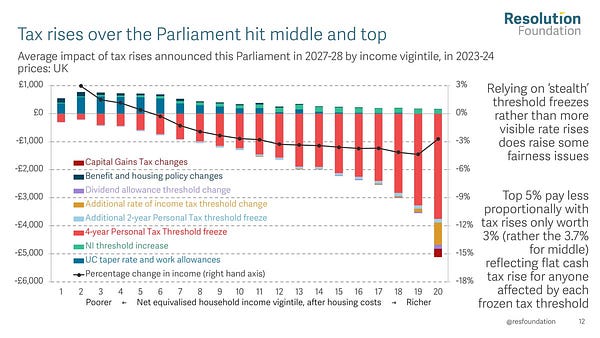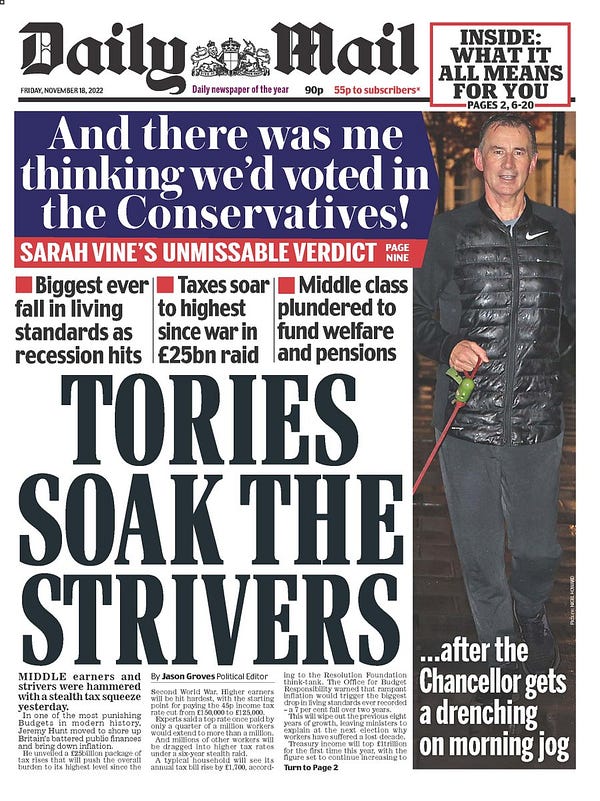Pain today, pain tomorrow
Autumn Statement fall-out + New podcast episode + Other stories that matter
Hello and welcome to the latest edition of Off to Lunch. Today we look at the fall-out to the Autumn Statement, our new podcast episode, the latest on FTX and Twitter and the start of the World Cup. Usually Friday’s edition is only available in full for paying Off to Lunch members but today it is free for everyone. If you enjoy Off to Lunch, please sign-up below to subscribe - it’s just £6-a-month or £50-a-year…
The Resolution Foundation and the Institute for Fiscal Studies have published their analysis of the Autumn Statement. These two organisations always publish reports the day after big fiscal announcements from the government. They look at the policies proposed and the forecasts from the Office for Budget Responsibility, the government’s financial watchdog. Their analysis is considered a definitive take on the proposals - and they often spot details that others have missed.
Their verdict is not optimistic, I am afraid. The headline on the Resolution Foundation’s report is “Help today, squeeze tomorrow”. I would say “help” is doing a lot of work in that statement. The report itself is more downbeat than that. This slide from the report struck me as particularly grim…


This graph tells a similar story by looking at household disposable income…


This chart is a great visualisation of how people will be hit by each measure announced in the Autumn Statement between now and 2027-28. Poorer households are on the left and richer on the right…


This graph explains why economists have described the Autumn Statement as “progressive” (ie the burden falls more on those able to pay it) but also explains why traditional Conservative-supporting newspapers gave the Autumn Statement this reaction…
You can read the full Resolution Foundation report here.
The verdict from the IFS is similar…


This slide from IFS shows how Jeremy Hunt backloaded cuts to public spending until after the election…


You can read the IFS’s full report and slides here.
In terms of other reaction, The Economist’s verdict on the Autumn Statement is that it was “an economic and political sleight of hand”. Its leader column says: “Even as he pretended to be tough, Jeremy Hunt, the chancellor of the exchequer, shuffled most of the difficult decisions on to the next government.” You can read it here. Perhaps the kindest thing it says about Hunt is that “unlike Ms Truss’s announcements, the autumn statement was at least sane; the risk of imminent financial disaster has been suppressed”. Ouch
For other post-Autumn Statement reading, check out Sir Martin Sorrell’s latest online column for The Times. While everyone may be feeling a bit gloomy about the outlook, Sir Martin says there are reasons to be optimistic - falling inflation in the US, China easing Covid-19 restrictions, Ukraine making progress in the war with Russia, some certainty for businesses and investors in the UK and a bounce in stock markets. You can read his column here.
Ambrose Evans-Pritchard in The Telegraph is not renowned for his optimism, the opposite in fact, so it is a pleasant surprise to see him crediting Hunt’s Autumn Statement as “much better than George Osborne’s austerity in 2010”. However, he adds: “Mr Hunt’s plan does little to correct the worst pathologies of the British economy. It further perpetuates some of them. We know what ails us: the UK consumes too much and produces too little, leading to a structural current account deficit of 4 per cent of GDP that requires constant inflows of foreign capital.” The UK needs to do more to generate and attract investment, he writes. You can read his piece here.
Podcast new episode…
The latest edition of Business Studies went live this morning and is very timely given England’s victory in the T20 World Cup. I speak to Ed Smith, the chief selector for England cricket between 2018 and 2021, about the recent success of English cricket and his new book Making Decisions. We discuss the art and science behind selecting players and decision-making more generally as well as what business and elite sport can learn from each other, the role of data, strategy, innovation and much more…
It’s a fascinating episode. You can listen on Substack here, Apple here and Spotify here. There will be bonus content on this episode for paying Off to Lunch members next week…
Other stories that matter…
“Reviewing third-party sources to locate investments.” There are some staggering lines in the FTX bankruptcy filing from John Ray. This is one of them. FTX did not have complete books or records about its investments and activities. The hunt is now on to try to find out what they were and where they are. As ever, Bloomberg’s Matt Levine has done a brilliant job of summarising the latest on FTX, Sam Bankman-Fried and what this all means (Bloomberg)
David Epstein’s excellent Range Widely newsletter has moved to Substack after Meta closed Bulletin, its newsletter platform. The first edition since the move features an interview with Annie Duke, the poker player and author, and someone Ed Smith references in the latest episode of Business Studies. Epstein speaks to her about her new book Quit: The Power of Knowing When to Walk Away. “When we think in advance about the signals we might see in the future that would tell us we ought to walk away — and then commit in advance to actually walking away when we see those — we are better off,” she says (Range Widely)
Is Elon Musk’s brutal management style better than the hypocrisy often seen in Silicon Valley? Yes, says this column (The Atlantic)
Sticking with Musk and Twitter, the latest news is that the company’s offices in San Francisco are closed until Monday after the new owner told staff to sign-up for “extremely hardcore” work or leave. There are loads of people on my Twitter timeline today preparing for the demise of the social network, some in jest, some not. What happens over the next coming days is likely to define this story. Can Musk start to build the Twitter he wants or will the company unravel as thousands of staff leave? Some reports suggest Twitter now has fewer than 1,000 employees. Before Musk’s takeover it had 7,5000 (BBC)
Is this the opposite problem to levelling up? Locals in the Dutch town of Veldhoven are upset at how fast semiconductor company ASML Holding is expanding (Bloomberg CityLab)
Legal & General has published some interesting thoughts on Solvency II reforms and controversial liability-driven investments (LDIs) following events of the last few weeks. Solvency II, it says, “will allow us greater flexibility to make appropriate investments, including ones which: develop new infrastructure, contribute to the UK Government's levelling-up agenda, and support positive climate outcomes”. On LDIs it says: “The extreme volatility in the UK gilt market following the mini-Budget has highlighted the need for technical changes to ensure the smooth functioning of both LDI and the government's financing of its debt.” (Legal & General)
Black Friday is officially next Friday but plenty of retailers have already started offering deals. Which? and Wired have done useful round-ups of the promotions that are actually worth considering (Which?) (Wired)
And finally…
Apparently a football tournament starts in Qatar on Sunday. The first game is Qatar v Ecuador at 4pm on Sunday, which is live on the BBC. England v Iran is at 1pm on Monday and is live on the BBC. USA v Wales is at 7pm on Monday and is live on ITV.
Simon Kuper has been writing some superb preview pieces for The Financial Times. You read his latest one today, which gives a fairly downbeat view of what the tournament will be like. “Beyond a handful of the knockout games, do not expect great football. Many teams here, such as Tunisia, would probably get relegated from England’s Premier League. Only a couple of national teams can match the best club sides, which can plug their weaknesses with transfers, and have training time to develop understanding between players,” he writes. Oh dear. Anyway, the full piece - and links to his other previews - is here.
The BBC has done an excellent collection of preview programmes in the run-up to the tournament, which are all available on iPlayer. I recommend checking out the How to Win the World Cup documentary, which contains interviews with a host of big names about their success in the tournament. Also, Gary Lineker, Alan Shearer and Micah Richards have done a collection of World Cup-themed episodes of Match of the Day Top 10, looking at the best goals, teams and matches from past tournaments.
Finally, The Rest is History podcast, an Off to Lunch favourite and part of Gary Lineker’s podcast production company Goalhanger Podcasts, is doing a series of World Cup specials. Over the last week they have been looking at the history of the World Cup and over the next 32 days they are publishing an episode every day looking at the history of each country that has qualified for the tournament…
The organisers of the World Cup have just confirmed that alcohol will not be sold in the stadium before, during or after matches. That news prompted this tweet from Budweiser, one of the main sponsors…
Thanks for reading. Off to Lunch will be back on Sunday with our press review. If you enjoy Off to Lunch then please share it with others and spread the word. If this newsletter was shared with you then please sign-up below to become a member, get Off to Lunch sent directly to your inbox, attend our forthcoming events and contribute to the work of Off to Lunch
Best
Graham









